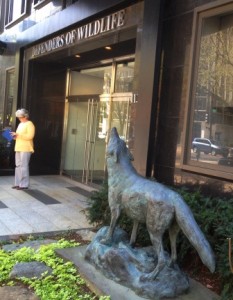As a member of the Wolf Conservation Center’s education team, road trips are not an uncommon part of my job. I’m often on the road traveling throughout the northeast to educate young and old about the importance of wild wolves. My adventure earlier this week, however, was different from most. I was traveling solo without my most impressive co-workers including Atka the wolf!
Defenders of Wildlife,
American Bird Conservancy,
Endangered Species Coalition,
Bat Conservation International,
National Resources Defense Council,
National Wildlife Refuge Association,
Sierra Club,
The Wildlife Society, and
WWF invited over two dozen U.S. citizens representing seventeen states to participate in a two-day advocacy marathon to help secure funding for wildlife programs. My fellow participants hailed from all walks of life. I joined hunters, anglers, bird watchers, paddlers, hikers, wildlife lovers, and business owners to meet with our Congressional representatives about the importance of funding for wildlife programs in the Fish and Wildlife Service and other agencies.
Our diverse group met at Defenders of Wildlife’s Washington DC Headquarters to meet our cohorts and for an overview of the current status of wildlife appropriations. We reviewed crucial programs that support wildlife and habitat conservation within the U.S. Fish and Wildlife Service, Bureau of Land Management, Forest Service, U.S. Geological Survey, National Oceanic and Atmospheric Administration, and Multinational Species Conservation Funds. Several members of the host organizations delivered compelling and educational presentations re: the severe cuts that threaten many federal wildlife and habitat conservation programs. We then split into teams and were assigned “Sherpas” to help us navigate the though the halls of Congress.
I was paired with James Brumm, a fascinating fellow and the Chair of the American Bird Conservancy, and together with our super Defenders of Wildlife Sherpa, Marcia Lesky, we prepared for the mission. Our team was the busiest of the bunch, Marcia scheduled seven meetings in all with representatives from both New York and Connecticut.
During all the meetings, the focus of my message was the importance of keeping the Endangered Species Act (ESA) strong. The ESA is one of our nation’s cornerstone environmental laws and has helped prevent the extinction of treasured wildlife including the bald eagle, Florida manatee, and California condor. It exists because of the citizens of this country and a bi-partisan Congress almost 40 years ago had a vision of responsible stewardship of the Earth. Thanks to the ESA, the reintroduction of wolves to our Nation’s landscape has helped to restore vital ecological processes and continues to impact our environment in positive ways scientists are only now beginning to realize. Wolves and other wildlife supported by the ESA have also proven to have great economic value. The wildlife-related recreation industry generates $122 billion annually here in the U.S.. Seems to me that wildlife is a great investment on many fronts.
At day’s end we gathered for a nice reception with all the amazing staff from the hosting organizations, some Congressional staffers, their bosses and more. It was an educational experience that I would welcome to repeat and I hope that our personal stories will have a positive impact on the future of our Nation’s natural treasures. Do you have a story you would like to share with your representative?
Visit
https://www.senate.gov/ to contact your Senator and
https://www.house.gov/ to contact your Congressperson. Please remember that we all have a voice and the right to use it in order to safeguard our planet for generations to come.




0 comments on “Making a Difference”